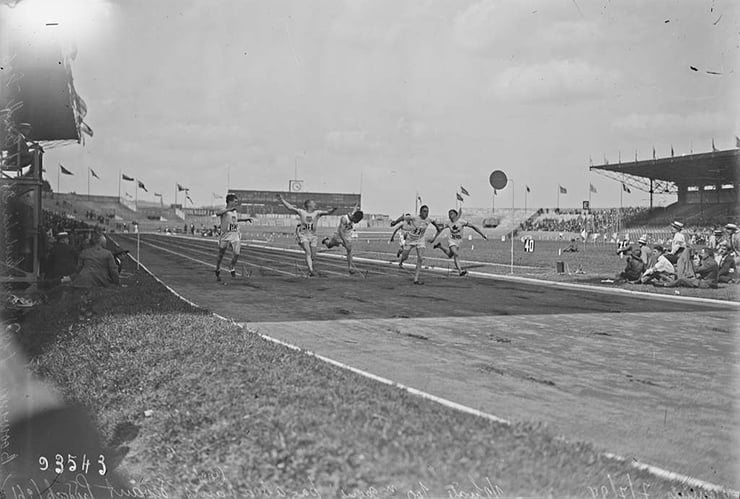With its drag-queen drama and parody of the Last Supper, France effectively transformed anti-Christian bigotry into an Olympic sport, and the spirit of friendship also took a hit. After defeating Israeli Baruch Shmailov in judo, Nurali Emomali of Takikistan declined to shake the Israeli’s hand, and instead reportedly punctuated his win with a yell of “Allahu Akbar.” That would have seemed strange to the Christian and Jewish athletes at the Paris Olympics in 1924, famously dramatized in the 1981 film Chariots of Fire.
Cambridge runner Harold Abrahams (Ben Cross) is the younger brother of Sidney Abrahams, who represented Britain at the 1912 Olympics in Stockholm. Younger brother Harold, born in 1899, followed in his footsteps but the film skips his previous effort at the 1920 Olympics in Antwerp. Harold Abrahams failed to win a medal in the 100 and 200 meters and in the long jump placed a distant 20th. Chariots of Fire picks up the story when Abrahams is preparing for the 1924 games in Paris.
Aware that talent is not enough, Abrahams becomes the first British athlete to hire a trainer, the famed Scipio Africanus “Sam” Mussabini, of Italian, Syrian, and French extraction but not a diversity hire. Mussabini (Ian Holm) shows Abrahams how to get the most out of his stride and avoid “juvenile” mistakes. Cambridge officials at first opposed to the coach are quite pleased when their “Semite” wins gold in the 100 meters.
Abrahams prevailed over Americans Jackson Scholz and Charles Paddock, with an Olympic record time of 10.6, not too shabby on a track of ground cinders. The film omits Abrahams’ silver medal for the 4×100-meter relay, in which he ran the lead leg. The following year, an injury ended his athletic career. Abrahams became an attorney, radio broadcaster, and served as chairman of the British Amateur Athletics Board from 1968 to 1975.
Israel began competing at the Olympics in 1952 and 20 years later, at the games in Munich, Palestinian terrorists murdered 11 Israeli athletes. What Harold Abrahams thought about the massacre has not emerged in print, but nothing like that took place in any previous Olympics. In 1924 it certainly would have shocked Edinburgh University student Eric Liddell (Ian Charleson), who gained fame as a rugby star.
Aware that “God made me fast,” the Christian evangelist wanted to compete in the 1924 Paris Olympics. Contrary to the film, Liddell knew all along that the 100 meters race would be held on a Sunday and trained instead for the 400 meters. Despite a rather wild running style, Liddell won gold in the (then) world-record time of 47.6 seconds. The gold medalist shunned the spotlight and returned to China to continue his family’s missionary work.
During World War II, Liddell wound up in a Japanese internment camp with other foreigners, including theologian Langdon Gilkey, author of Shantung Compound: The Story of Men and Women Under Pressure. Gilkey found Liddell “overflowing with good humor and love for life, and with enthusiasm and charm. It is rare indeed that a person has the good fortune to meet a saint, but he came as close to it as anyone I have ever known.” Liddell died there in 1945, and as the film says “all Scotland mourned.”
For Liddell and Abrahams, a drag-queen parade at the Olympics would have defied belief. Nothing like that had taken place in any Olympics to that time, and in 1924 everything was cordial among athletes of all nations. Abrahams died in 1978 and Chariots of Fire emerged in 1981, winning Academy Awards for best picture, screenplay, costume design, and musical score.
Ian Charleson passed away in 1990, followed in 1997 by the film’s executive producer, Dodi Fayed, who died in the car crash that took the life of Princess Diana. Ben Cross and Ian Holm died in 2020 and director Hugh Hudson in 2023.
For their part, this year’s games recall an event at the Rio Olympics in 2016.
Egyptian judoka Islam El Shehaby refused to shake the hand of Israeli opponent Or Sasson, who defeated him in the match. The Egyptian team sent El Shehaby home and the disciplinary commission of the IOC proclaimed his behavior “contrary to the rules of fair play and against the spirit of friendship embodied in the Olympic Values.” At this writing, no word on similar action against Nurali Emomali, and an ongoing sequel from the 1972 games has escaped attention.
The mastermind of the Munich massacre was Muhammad Abu Yousef al-Najjar, a commander of Fatah’s military arm Al-Assifa, and member of the PLO’s executive committee. In 1973, Israeli commandos killed Muhammad Abu Yousef al-Najjar and his son Yasser al-Najjar became a fugitive. In one account, he came to the United States as a foreign student, but documentation of his arrival and presence in the U.S. is hard to find. When National Public Radio profiled him in 2003, Yasser al-Najjar was an official of the Palestinian Authority living in Gaza.
Yasser’s son, Ammar Campa-Najjar, lives in the United States and is a Democrat who worked on the Obama campaign in 2012 and served in the Obama administration. The “Palestinian Mexican-American” ran for Congress in 2018 and 2020, losing to Republicans both times. After an unsuccessful run for mayor of Chula Vista, near San Diego, Campa-Najjar joined the U.S. Navy. That incredible journey has the makings of a movie, something like Olympic Afterburn or better yet The Munichian Candidate. Could be the feel-good movie of the summer.

Leave a Reply